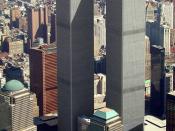The ripple effect of September 11th's terrorist attack upon the World Trade Center and the Pentagon has created an enormous void in America's economy.
With recession on everyone's mind, this unexpected and violent downslide has placed tens of thousands out of work and threatens to completely undermine the very foundation of the United States economic system. As a nervous nation looks ahead at the months to come, every indication seems to point to economic distress; according to economists, "the U.S. economy is going to experience some extremely tough times in the months ahead" (The Ripple Effect).
Concerns over inflation, unemployment and interest rates are not unfounded, inasmuch as every element necessary for a recession is currently present
within the American economy. While inflation has been a constant component of an already unstable market, the United States is now experiencing an even
greater separation between personal income and necessary expenditure to the point where people are finding it extremely difficult to meet basic needs.
Coupled with the recent surge in unemployment rates, America's delicate economic balance has become irreparably disproportional. The cyclical aspect of this situation finds that the jobless do not spend, the employed hold fast to their money and the supply and demand for virtually every commodity
comes to a screeching halt. "Consumers are like deer in the headlights.
They're just paused and waiting to see what happens next" (Ripple Effect).
Federal Reserve Chairman Alan Greenspan may have lowered interest rates with the intention of creating more security in spending; however, this good
faith gesture has not proven strong enough to bolster the crumbling courage of a nation in peril. "Analysts are now predicting that consumer spending -
which accounts for more than two thirds of total U.S. economic output - will suffer even more...

![English: United States mean duration of unemployment 1948-2010. Data source: FRED, Federal Reserve Economic Data, Federal Reserve Bank of St. Louis: Average (Mean) Duration of Unemployment [UEMPMEAN] ; U.S. Department of Labor: Bureau of Labor Statistics;](https://s.writework.com/uploads/3/35750/english-united-states-mean-duration-unemployment-1948-2010-d-thumb.jpg)
